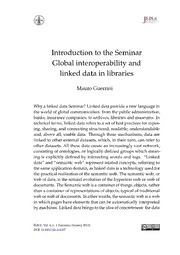
Introduction to the Seminar Global interoperability and linked data in libraries PDF
Preview Introduction to the Seminar Global interoperability and linked data in libraries
Introduction to the Seminar Global interoperability and linked data in libraries MauroGuerrini WhyalinkeddataSeminar? Linkeddataprovideanewlanguagein theworldofglobalcommunication: fromthepublicadministration, banks,insurancecompanies,toarchives,librariesandmuseums. In technicalterms,linkeddatareferstoasetofbestpracticesforexpos- ing,sharing,andconnectingstructured,readable,understandable and, aboveall, usabledata. Throughthesemechanisms, dataare linkedtootherexternaldatasets,which,intheirturn,canreferto otherdatasets. Allthesedatacreateanincreasinglyvastnetwork, consistingofontologies,orlogicallydefinedgroupswhichmean- ing is explicitly defined by interacting words and tags. “Linked data”and“semanticweb”representrelatedconcepts,referringto thesameapplicationdomain,aslinkeddataisatechnologyusedfor thepracticalrealizationofthesemanticweb. Thesemanticweb,or webofdata,isthenaturalevolutionofthehypertextweborwebof documents.TheSemanticwebisacontainerofthings,objects,rather thanacontainerofrepresentationsofobjects,typicaloftraditional weborwebofdocuments.Inotherwords,thesemanticwebisaweb inwhichpageshaveelementsthatcanbeautomaticallyinterpreted bymachines.Linkeddatabringstotheideaofconcreteness:thedata JLIS.it.Vol.4,n.1(Gennaio/January2013). DOI:10.4403/jlis.it-6307 M.Guerrini,IntroductiontotheSeminar arecorrelatedtotheresourceparticipatinginitscontentnature;the dataareanintegralpartoftheresourcebecausethisresourcewould not be represented without their data. The web of data is a web inwhichdataarepublishedandconnectedwiththetechniquesof linkeddata;itisawebinwhicheachdataismuchmorevisibleand, therefore,muchmore(re)usableandinteroperable. Inthiscontext itbecomescleartheneedforanintegratedaccesstodata,beyond its diversity, quantity, distribution and properties. This Seminar handlesprimarilytheissueofinteroperabilityandopennessofdata inthelibraryworld,byanalyzingstandards,experiencesandbest practicesfortheadoptionofsemanticwebtechnologiesinthisfield. The data, produced by libraries and maintained in their catalogs are not on the web, but rather isolated from the web. Here it is appropriatetowonder: “Howtomodifycataloguesanddatasothat theycanbeofthewebandnotonlyontheweb?”. Nevertheless, librarieshavealwaysproducedqualitativedatainhighlystructured bibliographic and authority records, as a response to the need of sharedrulesdisseminatedatnationalandofteninternationallevels. Unfortunately,todaythisdatabegintorepresentnothingmorethan ahugeamountofdata,unusedandunusable. Theadoptionofthe linkeddataapproachwillinvolvearadicalchangeinthecreation oftoolsofmediationbetweenuserandbibliographicuniverse. All sectorsofthelibraryservicewilldefinitelybeinterestedintheimple- mentationoflinkeddata.Inparticular,thewebsearch,bibliographic control(withbibliographicdescription),access,authoritycontrol, classification,dataportabilityanddisambiguationwillbestrongly advantaged. The library world and the world of the internet are bothinterestedintheintegrationwithinaglobalnetwork. Firstly, there is a need to ensure a global visibility and usability of data and,secondly,toexploitinformationandcreateincreasinglylarge andsignificantnetworks. Howwoulditbepossibletoachievethe JLIS.it. Vol.4,n.1(Gennaio/January2013).Art.#6307 p.22 JLIS.it.Vol.4,n.1(Gennaio/January2013) objectivepursued? • firstofall,thereisaneedtotransformthetextualdescription indatasetsusableforautomaticprocessesandelaborationsby machines; • besides,thereisanecessitytomakedataitemsuniquelyiden- tifiablewithinthewebinformationcontext; • then, it is important that data become compatible with the technologiesandwebstandards; • aswellasitisofbigimportancetouseacross-interoperable languagewithintheweb. ThisSeminaraimstohighlightthebenefitsthatthelinkeddatacan offertolibraries,providingadvicesonoperationalproceduresby whichtheycanparticipateinthedevelopmentofthesemanticweb. ThisSeminarintends,therefore,topresentanoverviewofinitiatives andevolvingtechniquesatthenationalandinternationallevels. It also aims at facilitating the discussion in Italy about the benefits oflinkeddataasanewcommunicationlanguagetoreducecosts, improveservicesanddelivergreatervaluetotheneedsoflibrary users, throughmoreeffectiveand, aboveall, moreshareddesign ofdigitalinformationenvironments. Finally,thisSeminarintends to encourage institutions and, in particular, libraries to invest in terms of skills and economic resources. Public institutions and individuals,whichchosetoopenandsharetheirdataontheweb, haveeverythingtogainfromthecreationofhighly-organizedand usefulinformation. JLIS.it. Vol.4,n.1(Gennaio/January2013).Art.#6307 p.23 M.Guerrini,IntroductiontotheSeminar Acknowledgment IwouldliketothanktheScientificCommittee,inparticularGinevra PeruginelliandGianfrancoCrupi,andtheOrganizingCommittee (representedbySandraTorreandAntonellaMarinaro),MariaTeresa NataleofICCUwhoworkedonthewebsite,AndreaTurchini,the creator of the logo, as well as translators of reports from English andItalian,andtheeditorialstaffof”JLIS.it“(whichhaspublished thepreprintversionofthepapersstartingfrom11June)fortheir decisivesupportgiven. Ialsothanktheco-sponsorsofthisSeminar, togetherwiththeUniversityofFlorence: ICCU,NationalCentral LibraryofFlorence,CasaliniLibri,theCityofFlorence,CRUI,IEA, Institute of Legal Information Theory and Techniques of the Na- tionalResearchCouncil,DigitalRenaissanceFoundation,AIB;the sponsors: Ex-Libris,JLIS.it,LinkedHeritage,AtCult,ItaleeSpace. MAUROGUERRINI,UniversitàdegliStudidiFirenze. mauro.guerrini@unifi.it Guerrini,M.”IntroductiontotheSeminarGlobalinteroperabilityandlinkeddatain libraries”.JLIS.it.Vol.4,n.1(Gennaio/January2013):Art:#6307.DOI:10.4403/jlis.it- 6307.Web. Published:2013-01-15 JLIS.it. Vol.4,n.1(Gennaio/January2013).Art.#6307 p.24
